- Home
- Marilynne Robinson
What Are We Doing Here? Page 3
What Are We Doing Here? Read online
Page 3
What Are We Doing Here?
The Liverpool Hope Hopkins Lecture, an Annual Public Lecture, Hosted by the Department of English at Liverpool Hope University: July 20, 2015
I have been reading lately about the rise of humanism in Europe and Britain. The old scholars often described themselves as “ravished” by one of the books newly made available to them by the press, perhaps also by translation. Their lives were usually short, never comfortable. I think what it would have been like to read by the light of an oil lamp, to write with a goose quill. It used to seem to me that an unimaginable self-discipline must account for their meticulous learnedness. I assumed that the rigors and austerities of their early training had made their discomforts too familiar to be noticed. Now increasingly I think they were held to their work by a degree of fascination, of sober delight, that we can no longer imagine. John Milton said, As well kill a man as kill a good book. He was arguing, unsuccessfully, against licensing, the suppression or censoring of books before publication. This was usual in the premodern and early modern world, of course. How many good books were killed outright by these means we will never know, even granting the labors of printers who defied the threat of hair-raising punishments to publish unlicensed work, and which others risked hair-raising penalties to own or to read. To put books into English, the vulgar tongue, the language of the masses, was once radical. Teaching literature written in English is a recent innovation, historically speaking, and was long regarded in the more renowned institutions as a lowering of standards. It is still the case in some countries that the work of living writers is excluded from the curriculum, perhaps a sign of lingering prejudice against the vernacular, against what people say and think now, in the always disparaged present. In America this scruple is gone and forgotten. Writers not yet dead, in many cases only emerging, are read and pondered, usually under a rubric of some kind that makes them representative of gender or ethnicity or region, therefore instances of some perspective or trend often of greater interest to the professor than to any of the writers. These categories, woman or black or immigrant, can be encumbrances from their point of view, obstacles to the reading of their work as something more than sociological data. If there are courses explicitly attentive to white men as a subgroup, I have never heard of any. Male and white is still the default where literature is concerned, in the academy, at least. This is not the fault of any of these men, and they should not be undervalued or misread on this account. But knowing what a book costs any writer, in years not least, I hope for the day when all good books can be read as speaking in as broad a voice, engaged with the Great Questions. However, I am too aware of the ragged beast history has been to fret over the fact that its manners are not perfect yet. I think it is most excellent that so many voices are being heard, and that the ongoing life of this endless human work is acknowledged in real time. This has supported the teaching of writing that is so widespread in American universities. These same living writers come into the universities to lecture and teach, as the great literary figures whose writing is consecrated by time could not do, even if they wished. This is in effect a system of patronage that leaves no one beholden, and that makes thousands of students aware that writers are not so unlike themselves, a valuable stimulus to aspiration.
All this works rather well. It has given me an interesting life, allowing me all the time a novel requires and every resource for following out the questions that arise as I work. I have enjoyed the company of young writers, and I have learned from them. I know that one is expected to bemoan the present time, to say something about decline and the loss of values. O tempora! O mores! But I find a great deal to respect.
* * *
That said, it is a familiar irony that prohibition and deprivation can make things potent and ravishing, and that plenty very often dulls our taste for them. There is a great deal of questioning now of the value of the humanities, those aptly named disciplines that make us consider what human beings have been, and are, and will be. Sometimes I think they should be renamed Big Data. These catastrophic wars that afflict so much of the world now surely bear more resemblance to the Hundred Years’ War or the Thirty Years’ War or the wars of Napoleon or the First World War than they do to any expectations we have had about how history would unfold in the modern period, otherwise known as those few decades we call postwar. We have thought we were being cynical when we insisted that people universally are motivated by self-interest. Would God it were true! Hamlet’s rumination on the twenty thousand men going off to fight over a territory not large enough for them all to be buried in, going to their graves as if to their beds, shows a much sounder grasp of human behavior than this. It acknowledges a part of it that shows how absurdly optimistic our “cynicism” actually is. President Obama recently set off a kerfuffle among the press by saying that these firestorms of large-scale violence and destruction are not unique to Islamic culture or to the present time. This is simple fact, and it is also fair warning, if we hope to keep our own actions and reactions within something like civilized bounds. This would be one use of history. And here’s another. We might stop persuading ourselves of the truth of notions that are flatly implausible in light of all we know, or could know if we cared to. Then we would be less confident in imposing our assumptions on behavior, including our own, that they cannot help us interpret. The aversion to history shelters some very important errors, and sometimes does so aggressively. A society is moving toward dangerous ground when loyalty to the truth is seen as disloyalty to some supposedly higher interest. How many times has history taught us this?
In the context of contemporary politics, someone who has a certain awareness of history—President Obama, for example—is expected to speak as if he did not. He is expected to have mastery of an artificial language, a language made up arbitrarily of the terms and references of a nonexistent world that is conjured out of prejudice and nostalgia and misinformation, as well as of fashion and slovenliness among the opinion makers. Any dialect becomes second nature to those who live among its speakers, and this one is pervasive in ordinary educated life. Anyone who has wandered now and then into the vast arcana of what we have been and done is prone to violating the dialect’s strict and narrow usage, and will be corrected. I am not speaking here of the usual and obvious malefactors, the blowhards on the radio and on cable television. I am speaking of the mainstream media, therefore of the institutions that educate most people of influence in America, including journalists. Our great universities, with their vast resources, their exhaustive libraries, look like a humanist’s dream. Certainly, with the collecting and archiving that has taken place in them over centuries, they could tell us much that we need to know. But there is pressure on them now to change fundamentally, to equip our young to be what the Fabians used to call “brain workers.” They are to be skilled labor in the new economy, intellectually nimble enough to meet its needs, which we know will change constantly and unpredictably. I may simply have described the robots that will be better suited to this kind of existence, and with whom our optimized workers will no doubt be forced to compete, poor complex and distractible creatures that they will be still.
Why teach the humanities? Why study them? American universities are literally shaped around them and have been since their founding, yet the question is put in the bluntest form: What are they good for? If, for purposes of discussion, we date the beginning of the humanist movement to 1500, then historically speaking, the West has flourished materially as well as culturally in the period of their influence. You may have noticed that the United States is always in an existential struggle with an imagined competitor. It may have been the Cold War that instilled this habit in us. It may have been nineteenth-century nationalism, when America was coming of age and competition among the great powers of Europe drove world events. Whatever etiology is proposed for it, whatever excuse is made for it, however rhetorically useful it may be in certain contexts, the habit is deeply harmful, as it has been in Europe as well, when t
he competition involved the claiming and defending of colonies, as well as militarization that led to appalling war. The consequences of these things abide. We see and feel them every day. The standards that might seem to make societies commensurable are essentially meaningless, except when they are ominous. Insofar as we treat them as real, they mean that other considerations are put out of account. Who died in all those wars? The numbers lost assure us that there were artists and poets and mathematicians among them, and statesmen, though at best their circumstances may never have allowed them or us to realize their gifts. What was lost to those colonizations? The many regions of the world that bore the brunt of them struggle to discover a social order they can accept as legitimate and authoritative, with major consequences for the old colonizers and the whole world. Who loses in these economic competitions? Those who win, first of all, because the foot soldiers of those economies work too much for meager, even uncertain pay and are exposed to every insult this cheapening of fundamental value visits on the earth and the air. How many artists and scientists ought there to be among those vast legions? And among their threatened children? There is a genius for impoverishment always at work in the world. And it has its way, as if its proceedings were not only necessary but even sensible. Its rationale, its battle cry, is Competition.
A great irony is at work in our historical moment. We are being encouraged to abandon our most distinctive heritage—in the name of self-preservation. The logic seems to go like this: To be as strong as we need to be we must have a highly efficient economy. Society must be disciplined, stripped down, to achieve this efficiency and to make us all better foot soldiers. The alternative is decadence, the eclipse of our civilization by one with more fire in its belly. We are to be prepared to think very badly of our antagonist, whichever one seems to loom at a given moment. It is a convention of modern literature, and of the going-on of talking heads and public intellectuals, to project what are said to be emerging trends into a future in which cultural, intellectual, moral, and economic decline will have hit bottom, more or less. Somehow this kind of talk always seems brave and deep. The specifics concerning this abysmal future are vague—Britain will cease to be Britain, America will cease to be America, France will cease to be France, and so on, depending which country happens to be the focus of Spenglerian gloom. The oldest literature of radical pessimism can be read as prophecy. Of course these three societies have changed profoundly in the last hundred years, the last fifty years, and few with any knowledge of history would admit to regretting the change. What is being invoked is the notion of a precious and unnameable essence, second nature to some, in the marrow of their bones, in effect. By this view others, whether they will or no, cannot understand or value it, and therefore they are a threat. The definitions of some and others are unclear and shifting. In America, since we are an immigrant country, our “nativists” may be first- or second-generation Americans whose parents or grandparents were themselves considered suspect on these same grounds. It is almost as interesting as it is disheartening to learn that nativist rhetoric can have impact in a country where precious few can claim to be native in any ordinary sense. Our great experiment has yielded some valuable results, here a striking demonstration of the emptiness of such rhetoric, which is nevertheless loudly persistent in certain quarters in America, and which obviously continues to be influential in Britain and Europe.
Nativism is always aligned with an impulse or strategy to shape the culture with which it claims to have this privileged intimacy. It is urgently intent on identifying enemies and confronting them, and it is hostile to the point of loathing toward aspects of the society that are taken to show their influence. In other words, these lovers of country, these patriots, are wildly unhappy with the country they claim to love and are bent on remaking it to suit their own preferences, which they feel no need to justify or even fully articulate. Neither do they feel any need to answer the objections of those who see their shaping and their disciplining as mutilation.
What is at stake now, in this rather inchoate cluster of anxieties that animates so many of us, is the body of learning and thought we call the humanities. Their transformative emergence has historically specifiable origins in the English and European Renaissance, greatly expedited by the emergence of the printing press. At the time and for centuries afterward it amounted to very much more than the spread of knowledge, because it was understood as a powerful testimony to human capacities, human grandeur, the divine in the human. And it had the effect of awakening human capacities that would not otherwise have been imagined.
Alexis de Tocqueville, an early and classic interpreter of American civilization, published his great Democracy in America, in two volumes, in 1835 and 1840. He was interested in the new society for its implications for civilization in Europe, especially France. His treatment of it is equable and perceptive, though he does have his doubts. Speaking in his introduction of the effects of the spread of learning in the countries of the West, he says:
From the moment when the exercise of intelligence had become a source of strength and wealth, each step in the development of science, each new area of knowledge, each fresh idea had to be viewed as a seed of power placed within people’s grasp. Poetry, eloquence, memory, the beauty of wit, the fires of imagination, the depth of thought, all these gifts which heaven shares out by chance turned to the advantage of democracy and, even when they belonged to the enemies of democracy, they still promoted its cause by highlighting the natural grandeur of man. Its victories spread, therefore, alongside those of civilization and education. Literature was an arsenal open to all, where the weak and the poor could always find arms.
This passage provides a sense of what became newly available to respect and admiration as knowledge spread through the populace—poetry, eloquence, wit, imagination, depth of thought—where they would not have been seen or acknowledged in earlier generations. The old humanist joy in what people are still abides in Tocqueville, and he draws a humanist conclusion about the brilliance of people simply as such. Old Walt Whitman wrote, “I celebrate myself, and sing myself, / and what I assume you shall assume, / For every atom belonging to me as good belongs to you.” Any excellence, while it is given by heaven, more or less at random from the world’s perspective, is testimony to the fact that human beings are endowed with a capacity for excellence, whatever form it takes in any individual case. Their natural grandeur, which is overturning the old order, is not a matter of political or economic power, which, according to Tocqueville, is a consequence of the emergence of these gifts and secondary to them. The splendor of the gifts themselves, as they are liberated by new areas of knowledge, by fresh ideas, makes the case for democracy.
It is to be noted that these gifts are highly individual. There is no talk here of the folk or the masses, though the transformation of society Tocqueville describes has potential for a radical, progressive overturning. There is no suggestion that those who are rising can or should be shaped or led toward participation in a benign new order foreseen either by them or for them. The social order is forming itself around change brought about by these individual expressions of a collective grandeur. Tocqueville sees something like inspiration sweeping through the West as knowledge spreads and science advances. Crucially, there is no mention of competition, no implication of a hierarchy of abilities or gifts. Every excellence, every achievement enhances the general wealth of possibility for yet more excellence. And it is interesting to note that for Tocqueville there is no simple notion of utility. This awakening of minds and spirits is a sunlight that falls across the whole landscape of civilization. The questions being put to us now—What good are the humanities? Why are they at the center of our education?—might, for all history can tell us, be answered decisively by this vision of the effects of learning, which did take hold and flourish as the study of ancient poetry, philosophy and language, Scripture and theology, and of history itself by means of the printing press and the rise of vernacular languages, long before
science and technology even began to come abreast of them.
Is Tocqueville describing something real? He stood at a place in the evolution of culture where there would be both a continuously new, because incremental, expansion of literacy and learning, and a vast population they had not yet touched. John Keats, briefly Tocqueville’s contemporary, was moved by an Elizabethan translation of Homer: “Then felt I like some watcher of the skies / When a new planet swims into his ken.” What was it that Keats took from this encounter? What “wild surmise”? Keats holds such a rarefied place in literature now that it is hard to believe he was once ridiculed as one of “the Cockney school of poetry.” But his sonnet is expressing that old humanist privilege, of being “ravished” by a book, and of finding that it has a suggestive power far beyond its subject, a potency the affected mind itself might be years in realizing. I talked once with a cabdriver who had spent years in prison. He said he had no idea that the world was something he could be interested in. And then he read a book.
In the history of the West, for all its achievements, there is also a persisting impatience with the energy and originality of the mind. It can make us very poor servants of purposes that are not our own. A Benthamite panopticon would have radically reduced the varieties of experience that help to individuate us, in theory producing happiness in factory workers by preventing their having even a glimpse of the fact that there could be more to life. Censorship, lists of prohibited books, restrictions on travel, limits on rights of assembly all accomplish by more practicable means some part of the same exclusions, precluding the stimulus of new thought, new things to wonder about. The contemporary assault on the humanities has something of the same objective and would employ similar methods. Workers, a category that seems to subsume us all except the idlest rich, should learn what they need to learn to be competitive in the new economy. All the rest is waste and distraction.

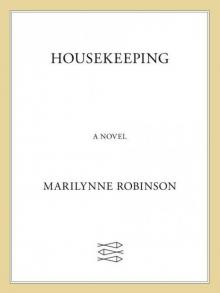 Housekeeping: A Novel
Housekeeping: A Novel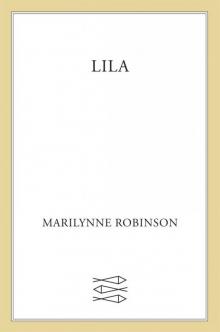 Lila
Lila Mother Country: Britain, the Welfare State, and Nuclear Pollution
Mother Country: Britain, the Welfare State, and Nuclear Pollution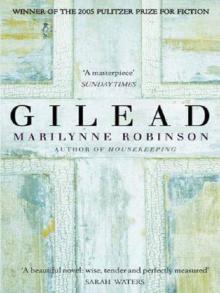 Gilead
Gilead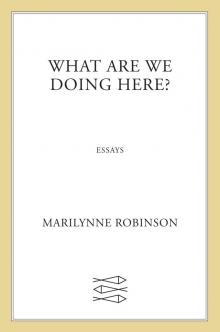 What Are We Doing Here?
What Are We Doing Here? Home
Home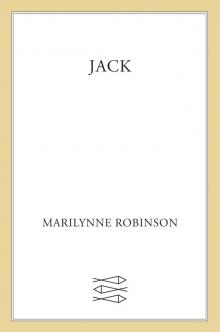 Jack
Jack Mother Country
Mother Country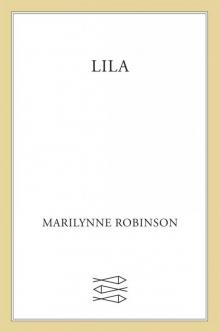 Lila: A Novel
Lila: A Novel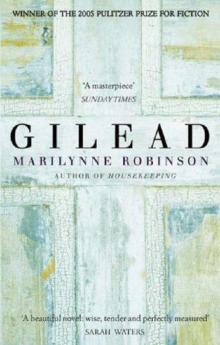 Gilead (2005 Pulitzer Prize)
Gilead (2005 Pulitzer Prize)